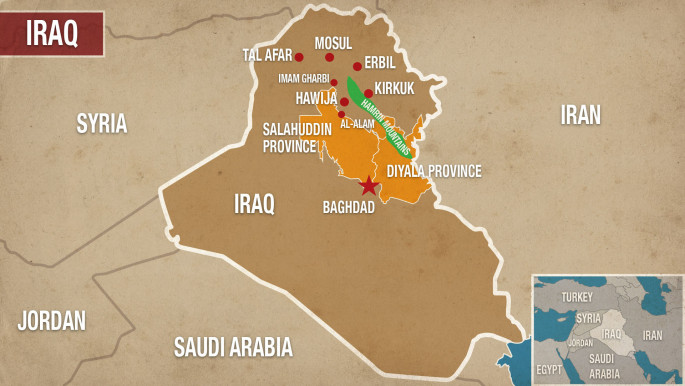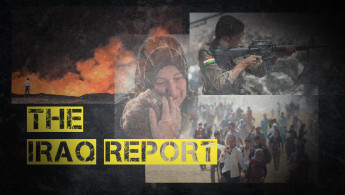The Iraq Report: Threat of civil war as Kurdish independence looms
The Iraq Report is a new weekly feature at The New Arab.
Click here to receive The Iraq Report each week in your inbox
In case Iraq has not yet seen enough conflict, the drums of war are beating once more over the oil-rich northern province of Kirkuk, claimed by all of Iraq’s three main ethnic groups. The Kurdistan Regional Government has included Kirkuk in its upcoming referendum, which has been condemned by the Iraqi government and allied Shia militias alike, as well as local Arabs and Turkmen.
The disputes come as both the KRG and Baghdad move military and paramilitary forces to squeeze IS out of Hawija, a provincial town in Kirkuk province. It is a battle that could prove key to the future balance of power in the country - and even whether or not the KRG will be able to establish and protect its proposed new borders by force of arms.
The race for Hawija
The one thing all parties in Iraq can agree on is the need to defeat IS and remove them from those few towns they still control. With IS’ loss of all of major urban territories in Iraq, most notably Mosul, the extremists appear to be on the back foot, not only in Iraq but also in neighbouring Syria.
However, IS retains the ability to strike deep in Iraqi government-held territory, using more conventional “terrorist attacks” such as car bombs to wreak havoc even in highly secured cities such as the capital, Baghdad. Although most of these attacks are planned and coordinated by local cells, Baghdad’s approach has been to rely on international and regional assistance to slowly recapture all IS-held territories, including Hawija.
Analysis: Hawija - the next battle in Iraq's war against the Islamic State group
However, and considering IS’ localised planning capabilities, recapturing Hawija will not necessarily end the IS threat, and may be seen by some here primarily as an attempt by Baghdad to reassert its authority in Kirkuk – after its troops fled the province in 2014, leaving the Kurdish Peshmerga to lead the fight against IS militants. Alongside Ana and Rawa in the western Anbar province, Hawija is one of the last IS strongholds in Iraq. Kirkuk province itself is meanwhile now under the de facto – if not de jure – control of the KRG, which irks the Iraqi government.
 |
Although Iraqi forces have been converging on Hawija for a fortnight, they have still not launched the operation. This may be due to the fact that the Peshmerga have also moved in on the area, placing the number of combined – though clearly disunited – Iraqi and Peshmerga troops at some 45,000 men. The Peshmerga are there to ostensibly fight IS, but in reality they are also likely there to deter the Iraqi army and allied pro-Iran Popular Mobilisation Forces from making further advances beyond simply dislodging IS.
Aside from recapturing one of the last vestiges of IS control, Iraq’s military presence in Hawija is also likely to be seen as an attempt to disrupt the KRG’s independence referendum, slated to take place on 25 September. Despite Turkmen and Arab opposition, the Kirkuk provincial council passed a motion to take part in the referendum, even though IS still holds Hawija. Hawija, a largely Sunni Arab town, will therefore not take part in the vote on whether Kirkuk should join the KRG and secede from Iraq - a vote that, should it take place in Hawija, would most likely be “No”.
 |
|
| Kurdish populated areas of the region [Click to enlarge] |
Redrawing Iraq’s borders
Iraq’s military presence in Kirkuk is technically legal – the entire province is not formally part of the KRG and is considered one of Iraq’s many “disputed territories”. However, Baghdad’s military failure to hold the province against the IS advance in 2014 created new facts on the ground by empowering the KRG, who reclaimed the territory and have now made it categorically clear that they will not withdraw, whatever the results of the referendum.
In an interview with the BBC on Monday, KRG President Masoud Barzani made an unequivocal threat that the KRG would be “prepared to draw our own borders” if Baghdad did not come to terms with the expected “Yes” result. Barzani also said that “if any group wants to change the reality of Kirkuk using force, they should expect that every single Kurd will be ready to fight over it”.
Barzani’s words are clear threats that, as the IS threat recedes, the main political factions in Iraq could very easily descend into a civil war over the future make-up of the Iraqi state, such as it may exist following such a war. While the plebiscite itself is only “advisory” and would not initiate an automatic secession from Iraq, it will be used as a stick with which to beat Baghdad during any future negotiations.
However, on the flipside, there are also implications for Barzani and other Kurdish leaders. Every major foreign power – from the United States to Turkey and Iran – oppose the referendum, with the most recent attempt at stalling the vote by Ahmad Abu al-Gheit, the secretary-general of the Arab League, rejected by Barzani on Sunday.
Barzani is positioning himself once more as a hero of Kurdish independence. But this will then increase domestic Kurdish expectations of Barzani and the KRG as a whole to deliver on their long-held promise to realise an independent Kurdistan in territories across northern Iraq - something which has failed to materialise despite almost 15 years since Saddam Hussein’s Baathist regime was toppled by the US-led invasion.
If independence continues to elude the Kurds, with no political agreement with Baghdad and a continuing deterioration of the KRG’s already fragile economy, this could lead to alternative Kurdish political movements that would seek to overthrow the established Kurdish leadership under Barzani and rivals from the Talabani clan, who will no doubt be blamed for using the dream of independence to enrich themselves at the expense of the hopes and ambitions of the people.
 |
| Iraqi Kurds supporting the independence referendum hold a rally outside the town of Akra [AFP] |
Iraq may prosecute US-led coalition over Mosul deaths
Mosul’s tragic saga has persisted and continued despite being recaptured by the federal government in Baghdad months ago. Residents continue to suffer from a lack of services, and have been subjected to campaigns of intimidation and arrests by Shia militants loyal to Iran.
They are also now being used as political tools, with an Iraqi government-linked human rights organisation calling upon the prosecutor’s office to take legal action against the US-led coalition’s air campaign. The majority of Mosul’s infrastructure, commercial and residential areas were reduced to rubble, during the assault, with Kurdish intelligence sources suggesting the total number of civilian fatalities was a horrific 40,000 dead.
Thousands of corpses belonging to civilians are expected to be found beneath Mosul’s rubble, leading Iraq’s official human rights commission to state that they were seeking the prosecution of the coalition.
“Numerous buildings in western Mosul, residential and commercial, have been destroyed [by coalition airstrikes], while nearly 2,000 bodies remain buried under the rubble,” commission member Wahda al-Jumaili said on Sunday.
“We are therefore calling on the Iraqi prosecution authorities to file an official lawsuit against coalition commanders for these violations of humanitarian law and failure to discriminate between civilians and combatants.”
However, the focus of the blame for civilian deaths on the coalition alone has raised concerns. Earlier this year, atrocities committed by government forces were heavily documented by numerous human rights organisations as well as the media, including The New Arab. Nevertheless, and despite numerous promises by Prime Minister Haider al-Abadi that his government would investigate allegations of war crimes and crimes against humanity, no government forces or PMF commanders have yet been prosecuted.
The commission’s failure to address Iraqi forces’ alleged atrocities has undermined its insistence on legal action against the US-led coalition.
Whatever the commission’s motives, without a recommendation for Iraqis also to face prosecution in light of increasingly mounting evidence that war crimes have been committed, the sense that Mosul’s residents are being used as political tools will not fade. This will likely lead to further resentment and a belief that the Iraqi political system serves the interests of the few at the top, not the many Iraqis suffering under a decade and a half of systemic dysfunction with no access to justice.
Click here to receive The Iraq Report each week in your inbox



